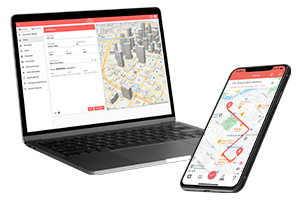Last updated on: May, 2024
As a realtor, using your vehicle for business purposes uses up a huge amount of your miles. Regardless of whether you are driving a potential future homeowner to 5 different locations on a Sunday or going to get snacks for your open house, these trips will all be tax-deductible for you as you drive your car for business purposes. The key to your tax savings on business trips as a real estate agent will be mileage logs.

What is Mileage Deduction?
Mileage deduction is a tax-saving mechanism that allows you to deduct vehicle expenses incurred for business-related travel from your taxable income. The IRS recognizes that as a real estate agent, you’re often on the move – showing properties, meeting clients, and attending industry events. These miles pile up, and so does your potential for savings!
Let’s dive into how using a mileage log for real estate agents can transform your business expenses into significant deductions.
How Much Is The Standard Mileage Rate?
The IRS announces a standard mileage rate every tax year that taxpayers can deduct for every business mile they have traveled.
The 2024 standard business mileage rate is 67 cents/mile, which can quickly add up to a considerable amount in tax deductions, which means more money in your wallet. Keep in mind to always calculate with the mileage rate of the year in which your deductible trips have occured.
Although it greatly depends on the average miles driven per year, the annual business mileage for a realtor is around 7,000 – 10,000 miles a year. This means a tax deduction of several $1,000s on average.
FAQs for Real Estate Agents About Mileage Deductions:
- Q: What trips count as business-related?
- A: Any travel directly connected to your real estate business counts. This includes driving to showings, property inspections, client meetings, and even trips to the office supply store for business needs.
- Q: Can I deduct mileage for my commute?
- A: Commutes from home to your primary office are generally not deductible. However, trips from your office to other business locations are deductible.
- Q: What records do I need to keep?
- A: For the standard mileage rate, log the date, miles, starting and ending locations and purpose of each trip. For the actual expense method, keep receipts for all vehicle expenses.
Examples of Possible Mileage Deductions
The 2024 standard mileage rate for business purposes is 67 cents/mile.
Let’s look at Emma for instance
She is a real estate agent who has had 5 clients looking for properties this month. Emma drives approx. 90 miles a day between properties and meetings. She hosts open houses, goes to realtor-sponsor lunches, and looks at potential “pocket listing” houses. 90 miles per day on average, for approx 300 days a year means that Emma drives 27,000 miles in a year for business purposes. Calculating for the whole year, Emma will be able to claim approx. $18,090 in tax deductions.
While you may drive more (or less) miles than Emma, it’s easy to see how this tax deduction is a successful realtor’s primary concern.
NOTE: If you prefer going with the Actual Expenses method instead of the standard mileage rate, you can deduct your car-related business expenses (like gas or auto insurance) in the ratio of your business trips – 90% business trips means that you’ll able to deduct 90% of your vehicle-related business expenses. It depends of your driving habits if this method is more worth it than the standard mileage rate.
But, let’s see the example of Roy
Roy leases his vehicle from the real estate agency where he works as an independent contractor. He drives roughly as much as Emma, but instead of choosing between the standard mileage rate or actual expenses, he can choose to write off his car lease payments or the standard mileage rate. With so many miles behind him, he will find that deducting the mileage rate will be more beneficial than deducting his car lease expenses.
Want to know how much mileage tax write-off are you eligible for? An average miles per year calculator can be used to calculate a rough estimate of how many miles you drive per year.
How to Claim Mileage Deductions as a Real Estate Agent
To claim vehicle mileage tax reimbursement and stay compliant, you need supporting IRS-Proof mileage logs. When your claim is audited, the Internal Revenue Service will expect you to have precise mileage logs.
Your mileage log must include:
- The total mileage you drove in the tax year for business (recording personal miles is strongly recommended, too)
- The first odometer and the last odometer readings of the year
- The date for each trip
- The addresses of the business locations you’ve visited
- And the purpose of your trips (i.e. “House showing”).
Tips for logging your miles
- Consistency: Whatever system you choose to log, make sure you stick to it and regularly keep it updated.
- Templates: Use free mileage log templates for an easy start. Real estate agents can use a handwritten logbook or a spreadsheet to manually log miles (Excel and Google Sheets templates are quite popular).
- Mileage tracker apps: However, apps like MileageWise are popular choices because they automate tracking and categorize trips based on GPS data.
Why a Realtor Mileage Tracker is Essential
As someone in the real estate small business world, you’re constantly on the move. Whether it’s client meetings, property showings, or attending industry events, every mile can add value to your tax deductions. That’s where a mileage app for real estate agents comes into play. It’s not just about recording miles; it’s about ensuring every eligible mile counts towards your car write-off.
Choosing the Right Mileage Tracker App
The market is flooded with options, but what makes for the best mileage tracking app? Here’s what to look for:
- Ease of Use: You want an app that’s intuitive and simple.
- Automatic Tracking: The best mileage tracker apps automatically record your trips.
- Detailed Reporting: Look for apps that provide detailed reports suitable for tax purposes, especially when it comes to complying with the stringent IRS-regulations.
FAQs About Realtor Mileage Apps
- Q: How do I ensure accuracy with a mileage tracker?
- A: Regularly review and categorize your trips in your realtor mileage app to ensure all business-related travel is accurately captured.
- Q: Are there free options available?
- A: Absolutely! There are free mileage tracker apps that offer basic features, however, the trade-off might be something you might want to avoid in the long run.
The Benefits of a Business Mileage Tracker
Using a business mileage tracker not only helps you deduct mileage efficiently but also keeps you organized. You’ll have a clear record of your vehicle expenses, which is essential when claiming the standard mileage rate on your taxes.
In conclusion, as a real estate agent, adopting a mileage tracker app is a smart move for your business. Not only does it simplify the process of logging vehicle expenses, but it also ensures you’re maximizing your car tax deductions. So, choose the right mileage app for your needs and start turning those miles into money-saving opportunities!
BE IRS-PROOF! JOIN OUR 20K+ USERS

You’ve already claimed a tax deduction in a previous year and now you’re being audited for mileage?
MileageWise helps customers of different age groups on a daily basis who are being audited by the IRS (including many real estate agents, realtors, or insurance agents) pass audits. Our mileage logging software has been designed to meet the strict requirements of the IRS and has been reviewed by IRS audit experts to ensure they are compliant. Put your business travel data into MileageWise to generate IRS-Proof mileage logs.
Do you have incomplete logs or you didn’t log at all?
Use MileageWise’s own AI-Wizard function. This tool enables you to set the amount of deduction you have claimed, the percentage of business trips, and other settings to create logs that match the deductions you have filed for.
Did you forget to record your trips in the past as a Google user?
Then you’re very lucky because if you have Location History turned on in your Google account, even if you have 1000+ trips/month, you can transform them into an IRS-Proof mileage log via MileageWise.
Are you too busy to create your logs?
Don’t worry, MileageWise has your back. Collect the data you’ve got, and our mileage log experts will create your mileage logs with the help of our software, which checks and corrects 70 logical conflicts in your mileage log to make sure it’s IRS-Proof.
Take advantage of your 14-day free trial, and try all of our unique features.
You will see for yourself that by creating IRS-Proof mileage logs in 7 minutes/month and saving yourself from the consequences of inaccurate mileage logs, MileageWise becomes the best deal for your dollar on the mileage log market.



